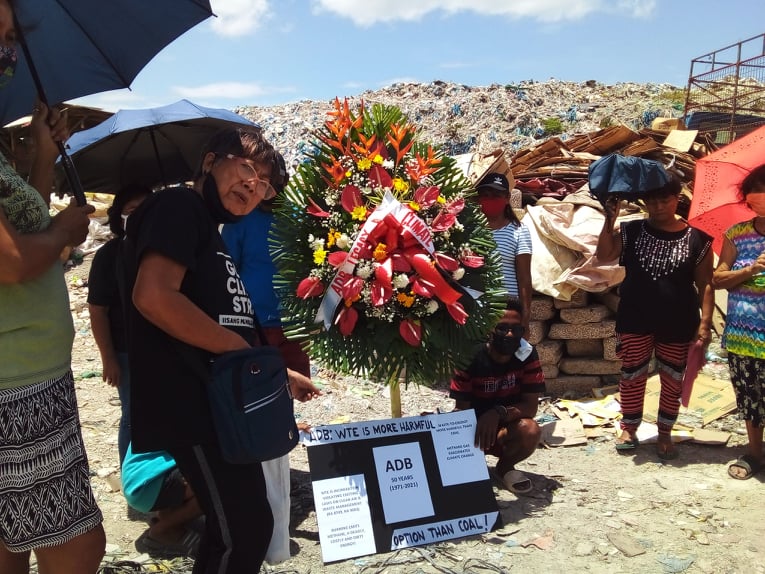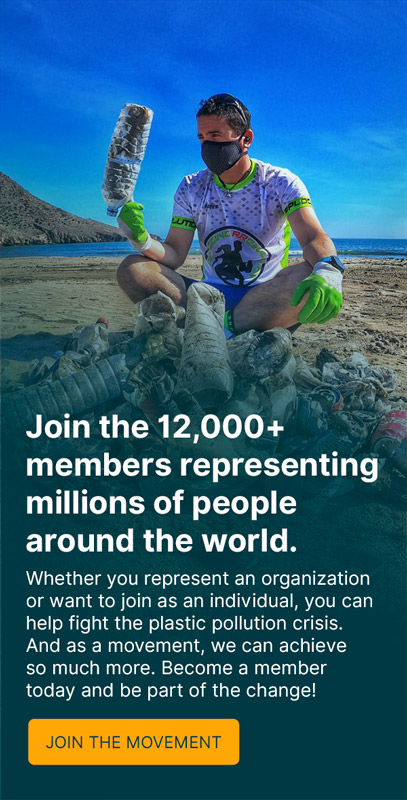Cebu City, Philippines – As the Asian Development Bank (ADB) convenes for its 54th Annual Meeting with the theme “Collaboration for Resilient and Green Recovery,” environment and climate activists and informal waste pickers in Cebu, Philippines affiliated under Sanlakas, No Burn Pilipinas, and EcoWaste Coalition staged a symbolic wreath laying protest action in the controversial and foreclosed Barangay Inayawan Sanitary Landfill to demand the withdrawal of ADB on all WtE incinerator projects in the city.
“The ADB is engaged in doublespeak calling for resilience and green recovery amidst the pandemic while actively promoting WtE incineration, particularly in Cebu by granting a Technical Assistance (TA) project to the Cebu City Government that paves the way for the establishment of incineration projects in the city despite a clear prohibition in the Philippine Clean Air Act of 1999 (Republic Act 8749) banning incineration to treat municipal, biomedical, and hazardous wastes,” according to Auxilium Olayer, a member of the EcoWaste National Executive Committee.
Barangay Inayawan Sanitary Landfill was the original site for the ADB-funded WTE project but was forestalled due to legal and technical issues. Through a Writ of Kalikasan, the Court of Appeals ordered a complete landfill rehabilitation pursuant to EMB standards. There were also different land claimants to a part of the barangay where the project is to be established. These project issues show that WTE projects increase existing environmental and social vulnerabilities because of the lack of government regulations and capacity to ensure community health standards, land use management and meaningful consultations on the ground.
While protests were staged in the ADB-funded project site in Barangay Inayawan on wastepicker displacements, environmental and community and safety issues, the ADB has expressed continued funding for WtE. In a live online meeting with civil society on the first day of the ADB’s annual meeting, Hemanthana Winthanage, International Coordinator of NGO Forum on ADB asked the ADB President Masatsugu Asakawa. ”Can ADB show real climate leadership by excluding thermal waste-to-energy from all its financing instruments?” to which the ADB President responded that WTE is an option and is also likely to continue depending on the results of the new ADB energy policy. WtE provides opportunities for integrated cross-sectoral projects.
More displacements of waste pickers
Informal waste pickers in Barangay Inayawan have been displaced as a result of the permanent closure of the city owned Inayawan Sanitary Landfill emanating from the Writ of Kalikasan decision of the Court of Appeals on December 15, 2016, later affirmed by the Philippine Supreme Court. These informal waste pickers have existing organizations but were never integrated into the city’s waste management system nor provided with adequate assistance to cope up with their loss of livelihood.
The ADB PFS recommends to subject to further investigation the health status of individuals involved with waste picking. The PFS describes the waste picking community in Barangay Inayawan as “highly vulnerable to any changes in the status quo”. Advocates believe that the ADB support on the WtE project will magnify existing economic displacements.
Environmental and social risks
Despite a standing ban on incinerators in the Philippines, the ADB technical assistance pursued the development of a Pre-Feasibility Study (PFS) of solid waste management Public Private Partnership (PPP) projects in Cebu City in 2018. It included a menu of waste treatment options, all incineration and thermal-based technologies, such as incineration with energy recovery (no pre-treatment); mechanical Biological Treatment (MBT) bio-drying followed by incineration; and MBT bio-drying followed by solid waste recovered fuel (STF) to cement kilns.
The same study identified potential environmental and socials risks and impacts associated with the above-mentioned waste treatment options including hazardous air emissions containing particulate matter, acidic gases, dioxins and other unknown toxic substances which may have potential health implications from incorrect operation or maintenance of equipment; land contamination from incorrect disposal of bottom ash or air pollution control residues; loss of livelihood by formal and informal sector; poor local acceptance of technology; and nuisance odour from bio-drying if not operated or maintained correctly.
The risks and impacts enumerated in this ADB-funded PFS corroborates with the findings of experts that all thermal waste to energy technologies produce poisonous and toxic substances, such as particulate matter, toxic metals, polyaromatic hydrocarbons, and polychlorinated dioxins and furans which are among the most toxic chemical substances known to science.
Communities and waste pickers need to be consulted on the risks and to their livelihoods and community health. ADB safeguards on meaningful consultation, pollution mitigation and community health standards must apply in all of its projects ” Olayer, also a senior official of Sanlakas in Cebu, further added that anything less than an exclusion of WtE incineration from ADB policies will not promote resilience and recovery from the current pandemic as communities with pre-existing health conditions already suffering from the impacts of badly mismanaged private landfills will experience more vulnerabilities if this ADB-initiated WtE incineration plant pushes through in Cebu City or in other parts of the Cebu Island.
The protest action is part of the global civil society demand led by the Global Alliance for Incinerator Alternatives (GAIA) and the wider climate movement for ADB to divest from WTE projects and stop urging the developing member countries to pursue thermal-based technologies of energy conversion from waste, including the provision of technical assistance in Asia due to its proven health, social, environmental, and climate risks.
In a letter signed by 53 international, regional, and national organizations, GAIA has raised its demands ahead of the ADB meeting, to exclude WtE incineration and other thermal-based technology from ADB Energy Policy and all its climate and green investment policies and financing instruments. It also demanded for the review of the environmental and social safeguards implementation in all WtE incineration projects including technical assistance projects in the Philippines that are currently paving the way for establishing incineration projects with the private sector despite existing national law banning all forms of incinerations.
“ADB’s response on WtE will delay the achievement of our climate goals and even post-pandemic recovery in the region. We demand ADB to stop wasting public resources and empowering polluters in the guise of climate action”, says Yobel Putra, GAIA Asia Pacific Climate Clean Energy Campaigner.
Sanlakas, No Burn Pilipinas, and EcoWaste Coalition are members and affiliates of GAIA calling for the withdrawal of WtE incinerators supported by the Break Free From Plastics Project in the Philippines.
_______________________________________________________________________
Contact Persons: (on-site) Auxilium Olayer, EcoWaste Coalition & Sanlakas: 09156228999 (off-site) Lito Vasquez, EcoWaste Coalition/Break Free From Plastic PH Project: 09551805627 (for additional information on ADB involvement in the proposed WtE projects in Cebu, Philippines



